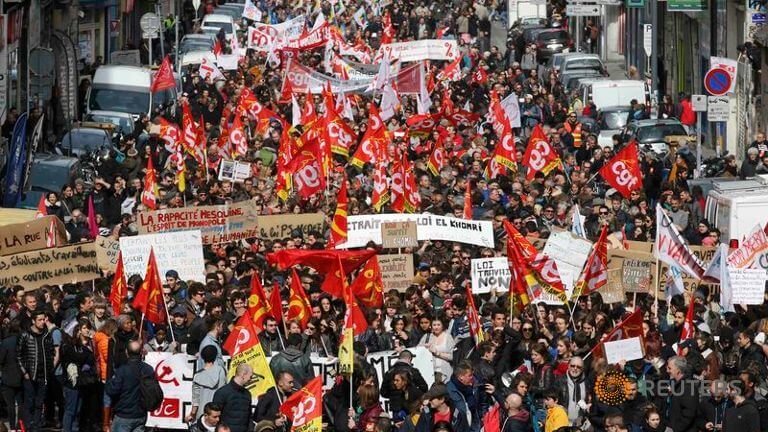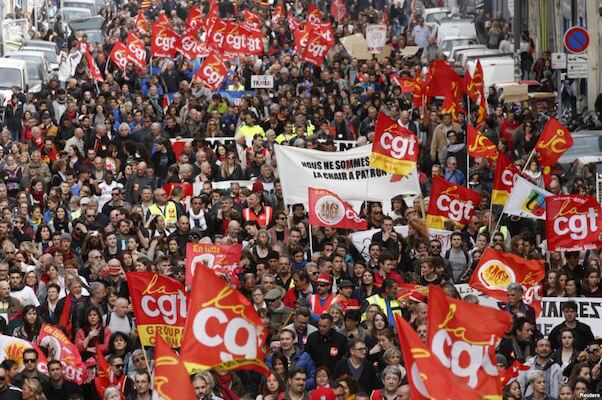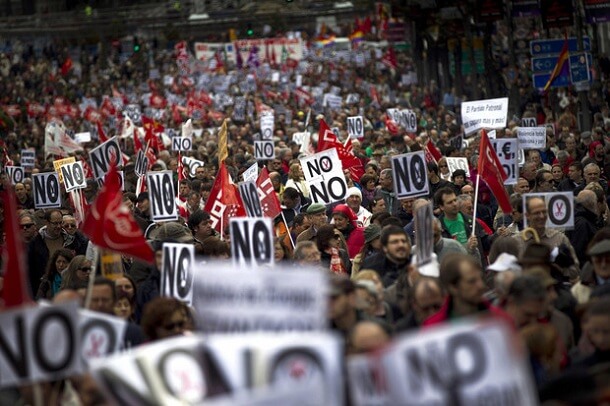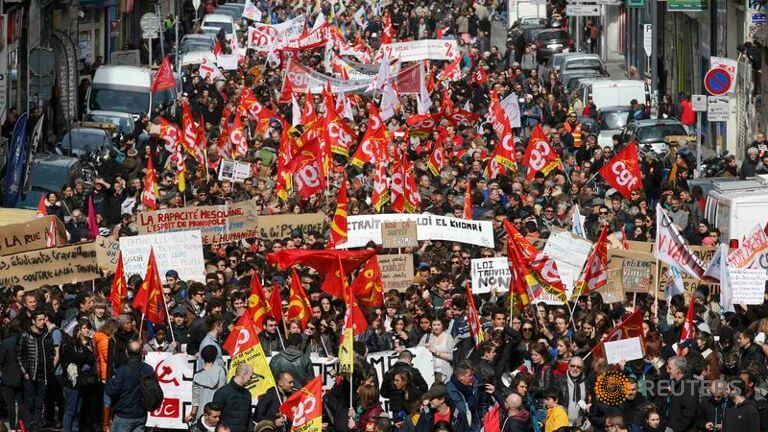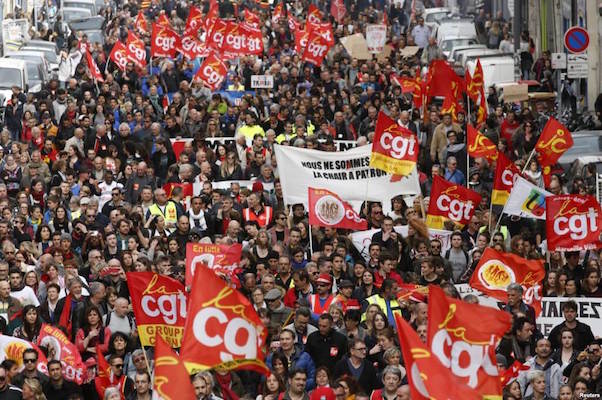By Carlos Aznarez / Source Resumen Latinoamericano / The Dawn News / May 27, 2016
Oil shortages and threats to cuts in electricity supply due to stoppages in nuclear centrals
On Thursday, May 26, France experienced a new day of demonstrations and stoppages as part of the unions’ protest against Francois Hollande’s labour reform.
To express their firm rejection to the labour reform, unions have taken to the streets. There’s scarcity of fuel in over 4,000 gas stations, harbors and oil refineries are blocked and nuclear centrals are possibly going to be paralyzed.
Violence has erupted in half a dozen cities. The government considers these actions to be nothing more than the expression of a minority that “illegally” threatens the productive activity in the country, and therefore announced “very firm” reactions against them.
Truck drivers, railroad workers, comptrollers and employees of the energy sectors have, once again, been the most active ones in the protests. Over a third of the trains haven’t made their routes and 15% of the flights haven’t taken off. On Wednesday 25, workers also voted in favor of making stoppages and demonstrations in the 19 nuclear centrals of the country, which produce 75% of the electric power of the country.
Massive demonstrations
Since the early hours of the day, from north to south, workers have blocked roads and harbors in Nantes, Rennes, Cherbourg, Brest and Le Havre. In Paris, hundreds of trucks have blocked the roads and caused traffic jams that were several kilometers long around the capital.
At noon, somewhere between 153,000 and 300,000 people (depending on whether you ask the police or the protesters) took part in the demonstrations held all over the country. The leader of the General Confederation of Labour (CGT), Philippe Martinez, led the mobilization in Paris where 19,000 people (or 100,000, according to the unions) protested.
No news in the newsstands
The strike has also prevented the arrival of most newspapers to the newsstands. This had already happened in the previous stoppages of March 31 and April 28.
On that occasion, the CGT, which is the most active union central in this conflict, had demanded newspapers to publish a declaration against the labour reform. The left-wing newspaper L’Humanité, which publishes the column, is already in the newsstands.
Workers vs. State and repressive forces
Incidents, police clashes and destruction of public properties have been registered in at least half a dozen cities. Discontempt against the repressive forces that act against the people is evident. Police officers, using tear gas, detained 12 young people in Paris and 65 in the rest of the country. In Burdeos (where more than 3,000 protesters reunited), the police station and police cars were attacked with rocks and other projectiles. In Lyon, (3,000) protesters threw paint at the agents. In Nantes (1,300), several masked people threw objects or paint against the newspaper Ouest France and the news station France 3 Ouest. In Rennes (3,500), several people blocked the railroads.
The GCT, the most important union in France, with over 600,000 members, is willing to “stop France” to force the Executive to annul the bill. “We don’t want to negotiate on it, we just want it to be annulled”, added Jean-Claude Mailly, leader of the third biggest French union, Workers’ Strength, who was present in the demonstration.
The government refuses to give in
The Executive, which approved the reform by decree, is not willing to back down either. On Wednesday, the chief of the socialist party in power, Bruno Le Roux, affirmed that they were willing to discuss the most controverted item of the reform: the primacy of agreements made at a company-level over the agreements made at a sector-level. But he was immediately corrected by the Prime Minister, Manuel Valls: “neither stepping down nor making concessions”, the chief of the executive said. “The CGT is not the one who makes the laws in France”.
The government plans to only include some improvements and modifications, but “a change of direction is not in sight”, as Valles said in the BFMTV news network. They plan to include some changes in the Parliament and pass the bill in July.
A little source of consolation for the government: not all of the unions are truly representing the interests of workers. The reformist French Confederation of Unions (CFDT) just asked for small changes in the law, and publicly demands for the bill not to be annulled.
The police lifted the blockades in two of the six blocked oil refineries (there are eight in total in France). Unions also blocked 11 of the 92 oil deposits of the country.
Due to the scarcity of oil, in many departments the authorities have decreed that establishments can only sell a maximum of 20 liters per customer. The government says there is enough gas in the strategic reserve of fuel to supply the country for three months.
So far, people are supporting the protests. According to a poll cited by RTL, 62% of the French population is in favor.
If this isn’t enough to break the government’s stubbornness and lack of sensitivity towards its own citizens, workers have another ace up their sleeve: the Eurocopa, which is the most important soccer tournament in Europe. It will begin in France on June 10. The unions announced they will increase all measures of protest by then.
